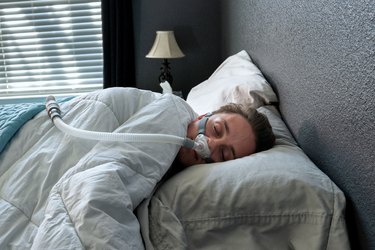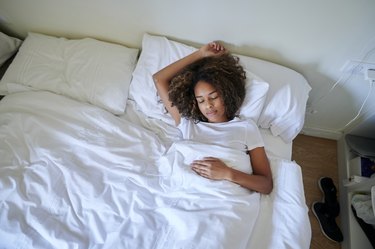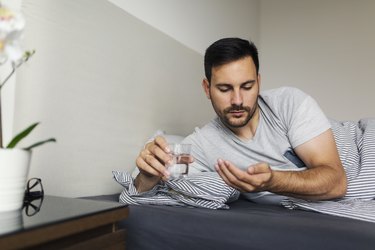
If you've got a condition called sleep apnea or suspect you might (maybe you keep waking up in the middle of the night or often wake up in the morning with a headache), a continuous positive airway pressure (CPAP) machine is the gold standard treatment, offering scores of benefits for sleep quality and overall health.
But how do you get a CPAP machine? And how much do these machines cost?
Video of the Day
Video of the Day
Here, we'll break down how to get a prescription for one of these devices, where to buy one, how much you can expect to pay and the alternative treatments that exist for sleep apnea.
What Is a CPAP Machine?
A CPAP machine is a device worn during sleep to help manage the symptoms of sleep apnea, a condition that causes you to stop breathing while asleep and prevents you from getting enough oxygen, per the National Heart, Lung, and Blood Institute (NHLBI). The device delivers a continuous stream of air through your mouth and/or nose that helps keep your airways open while you slumber.
There are a few different types of CPAP machines, but they generally include a mask you wear, a small motor and a tube that connects the two, per the NHLBI.
The mask is worn over your nose and mouth or sometimes just over your nose and is held in place by straps. The motor blows pressurized air into the tube and keeps a steady stream flowing into your nose and mouth throughout the night. Some of these machines have extras like heated humidifiers or adjustable pressure settings, per the Cleveland Clinic.
CPAP machines treat obstructive sleep apnea (OSA), the most common form of the condition in which your airway becomes blocked while you sleep. These machines are also sometimes used to treat central sleep apnea, when your brain doesn't send your body the signal to breathe during sleep, but it's not always the best treatment for this form of the condition.
The benefits of using a CPAP machine when you have sleep apnea include reduced symptoms (think: better sleep quality and less snoring), but also long-term health benefits such as improved memory and cognitive function and a lower risk of serious health conditions like stroke, per the NHLBI.
How to Get a Prescription for a CPAP Machine
To get a CPAP machine, you'll need a prescription from a health care provider, such as your primary care doctor or a sleep specialist, who has diagnosed you with sleep apnea. The hallmark symptoms of sleep apnea include loud snoring, gasping for air and breathing that starts and stops during sleep, per the NHLBI.
Not everyone with sleep apnea has these symptoms, though, and it can be difficult to know you have them if you sleep alone. Other signs of sleep apnea include daytime sleepiness, morning dry mouth and/or headache, insomnia, waking up often to use the bathroom and decreased sex drive or sexual dysfunction.
If your provider suspects you have sleep apnea, they'll likely have you undergo a sleep study, which can be done at home or at a sleep lab, says Carleara Weiss, PhD, RN, a behavioral sleep medicine and circadian rhythm specialist and a sleep science advisor for Aeroflow Sleep.
"The sleep study will indicate key information for the CPAP prescription, such as the apnea-hypopnea index (AHI), or how many times a person stops breathing during sleep, how low their oxygen levels go and the respiration effort they make," Weiss says.
The provider then uses this information to prescribe the appropriate type of CPAP machine and mask, along with the right amount of air pressure you'll need to sleep better, she explains. You can then use the prescription to purchase a CPAP machine and equipment on your own, but your provider may be available to help train you on how best to use the machine.
Where to Buy a CPAP Machine
CPAP machines and different types of masks are available for purchase at medical supply stores or online from many different retailers, although you'll always need a prescription to buy one. However, Weiss says she recommends getting a machine through insurance, as this is usually the most cost-effective option.
"There are companies such as Aeroflow Sleep that will help get the CPAP machine free through insurance," she says.
Most insurance plans, including Medicare, cover CPAP machines and equipment so long as you've gotten a sleep apnea diagnosis and a prescription for the device from a health care provider, according to SleepApnea.org. (Most also require proof you're using the machine in order to continue covering it.)
You can also ask your health care provider if they recommend a specific store or website to purchase your machine.
As for which type of CPAP machine to buy, Weiss says you should follow your provider's recommendations.
"The sleep study data reviewed by a sleep specialist is the best way to determine which type of CPAP machine is right for you," she says. "Their decision will consider your breathing pattern, facial structure and whether you're a mouth- or nose-breather to assign a nasal, full or hybrid mask."
The provider should also consider your comfort level and overall preferences as much as possible, she adds.
CPAP Machine Cost
If you have health insurance, the cost of a CPAP machine will vary depending on your plan's specific deductible and copay. To avoid any surprises, you can call your insurance company to verify what your plan will cover and what kind of out-of-pocket costs you'll be responsible for.
Medical savings accounts like a Health Savings Account (HSA) may be used to help you pay for a CPAP machine and accessories.
If you don't have health insurance, you can still buy a CPAP machine with a prescription. Purchasing a machine online may be cheaper than buying one in person, per SleepApnea.org, although you won't be able to try on the mask beforehand or get a demo on how to use it.
According to the National Council on Aging, the average cost of a CPAP machine is about $800, with prices ranging from $650 to just shy of $1,000. Prices may vary based on the features included with the machine, and you may be able to bring down the cost with coupons or assistance programs. If you're shopping online, it may be worth comparing a few different retailers to find the best deal.
Alternative Treatments for Sleep Apnea
"CPAP is the gold standard treatment for OSA, so it is the first line of choice when prescribing treatment," Weiss says. "However, CPAP is not the only treatment."
She says some people with sleep apnea may be prescribed the following, instead of or in addition to a CPAP machine:
- Oral appliances, such as a tongue-retaining device, which holds the tongue in place to prevent it from blocking the airway
- Lifestyle changes, such as reaching a healthy weight, getting regular exercise, quitting smoking and limiting alcohol and caffeine
- Changing sleep positions, because sleeping on your side instead of your back can help keep your airway open while you sleep
- Therapy that helps strengthen your mouth and facial muscles
- Surgery, including procedures that remove tissue from your mouth and throat to help widen your airway
The NHLBI also notes that the FDA recently approved the weight-loss medication tirzepatide (Zepbound) to treat moderate to severe sleep apnea in adults with obesity, to be used in combination with increased physical activity and a healthy eating plan.
The Bottom Line
To get a CPAP machine for sleep apnea, you'll need to undergo a sleep study and get a prescription from a health care provider. You can use the prescription to purchase a machine and accessories from a medical supply store or online retailer, and insurance typically will cover some or all of the cost. Talk to your doctor about the best type of CPAP machine for you and alternative treatments that may also help with your symptoms.
- National Heart, Lung, and Blood Institute: "What Is Sleep Apnea?"
- National Heart, Lung, and Blood Institute: "CPAP"
- Cleveland Clinic: "CPAP Machine"
- National Heart, Lung, and Blood Institute: "Sleep Apnea Symptoms"
- SleepApnea.org: "How to Buy a CPAP Machine: From Prescriptions to Replacement Parts"
- National Council on Aging: "How Much Does a CPAP Machine Cost?"
- National Heart, Lung, and Blood Institute: "Sleep Apnea Treatment"
- FDA: "FDA Approves First Medication for Obstructive Sleep Apnea"
Is this an emergency? If you are experiencing serious medical symptoms, please see the National Library of Medicine’s list of signs you need emergency medical attention or call 911.


